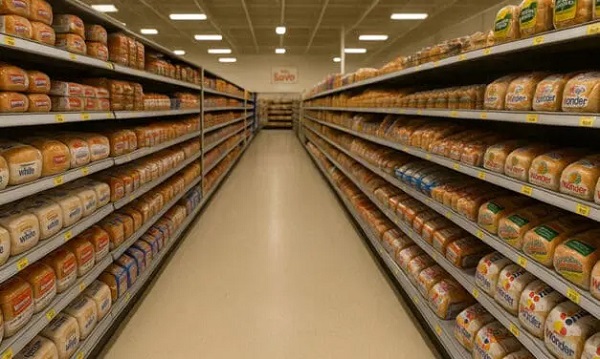Business
Big grocers rigged bread prices and most walked away free

This article supplied by Troy Media.
 By Sylvain Charlebois
By Sylvain Charlebois
Canada’s bread price-fixing scandal is one of the most damaging breaches of corporate trust in the history of Canadian food retail. The recent approval
of a $500-million class-action settlement by an Ontario court is a significant—though partial—step toward accountability. But the story isn’t over.
For over a decade, grocery giants secretly rigged the price of the country’s most basic food item, and most Canadians had no idea.
From 2001 to 2015, retailers and suppliers deliberately coordinated to raise the price of packaged bread, a basic household staple. This kind of illegal arrangement, known as price-fixing, occurs when supposed competitors agree to set prices rather than compete, driving up costs for consumers. Companies named in the lawsuit include Loblaw, its parent company George Weston Ltd., Metro, Sobeys, Walmart and Giant Tiger.
The impact on consumers was steep. Estimates suggest Canadians were overcharged by more than $5 billion over 14 years. The added cost was hidden in weekly grocery bills, largely unnoticed, but cumulatively devastating, especially for lower-income households that spend a greater share of their income on food.
The Competition Bureau, Canada’s competition watchdog, launched its investigation in 2015 after Loblaw came forward as a whistleblower under its Immunity and Leniency Program. In exchange for cooperating, Loblaw and George Weston were granted immunity from criminal prosecution. Their disclosure triggered years of scrutiny. In 2017, the companies attempted to contain the public backlash by offering $25 gift cards to 3.8 million Canadians, a gesture that cost $96 million and was widely seen as inadequate.
More recently, in 2023, Canada Bread pleaded guilty and paid a record $50-million fine for its role in the scheme. Although the violations occurred while it was owned by Maple Leaf Foods, it was Grupo Bimbo—which acquired Canada Bread in 2014—that took responsibility and cooperated with regulators. It was a rare show of accountability in a case otherwise marked by corporate silence.
Despite multiple companies being implicated, only Loblaw, George Weston and Canada Bread have admitted wrongdoing. No fines or sanctions have been imposed on the others. Walmart, Metro, Sobeys and Giant Tiger—all named by Loblaw—deny the allegations. Yet the investigation drags on nearly a decade later.
This imbalance in accountability has deepened public frustration. Many Canadians believe only those who stepped forward have faced consequences,
while others remain untouched. Or perhaps Loblaw threw its competitors under the bus in a calculated effort to save its own reputation?
The $500-million settlement—$404 million of it from Loblaw and George Weston —was approved by an Ontario judge earlier this month as “fair, reasonable, and in the best interests of class members.” The other $96 million reflects the earlier gift card program. What’s left to be paid amounts to about $13 per Canadian adult. After legal fees and administrative costs, 78 per cent of that will go to eligible Canadians outside Quebec, with the remaining 22 per cent reserved for Quebecers, pending a June 16 court hearing.
But for many, the money and the apologies do little to restore trust. If companies can quietly collude on something as essential as bread, it raises questions about what else might be going unnoticed in our grocery bills. The scandal exposed major weaknesses in Canada’s food retail system: toothless competition laws, limited pricing transparency and weak deterrents against collusion. These investigations take too long, and the damage to public confidence lingers long after the cheques are cashed.
Bread is not just a commodity. It symbolizes nourishment, affordability and stability. Manipulating its price isn’t just a legal violation; it’s a betrayal of public trust.
If this case is to be a turning point, it must lead to more than payouts. Canada needs stronger enforcement, faster investigations and real transparency in pricing. Without systemic reform, Canadians will remain vulnerable to the next coordinated “market adjustment,” hiding in plain sight on store shelves.
Dr. Sylvain Charlebois is a Canadian professor and researcher in food distribution and policy. He is senior director of the Agri-Food Analytics Lab at Dalhousie University and co-host of The Food Professor Podcast. He is frequently cited in the media for his insights on food prices, agricultural trends, and the global food supply chain.
Troy Media empowers Canadian community news outlets by providing independent, insightful analysis and commentary. Our mission is to support local media in helping Canadians stay informed and engaged by delivering reliable content that strengthens community connections and deepens understanding across the country
Business
The EU Insists Its X Fine Isn’t About Censorship. Here’s Why It Is.

Europe calls it transparency, but it looks a lot like teaching the internet who’s allowed to speak.
|
When the European Commission fined X €120 million on December 5, officials could not have been clearer. This, they said, was not about censorship. It was just about “transparency.”
They repeat it so often you start to wonder why.
The fine marks the first major enforcement of the Digital Services Act, Europe’s new censorship-driven internet rulebook.
It was sold as a consumer protection measure, designed to make online platforms safer and more accountable, and included a whole list of censorship requirements, fining platforms that don’t comply.
The Commission charged X with three violations: the paid blue checkmark system, the lack of advertising data, and restricted data access for researchers.
None of these touches direct content censorship. But all of them shape visibility, credibility, and surveillance, just in more polite language.
Musk’s decision to turn blue checks into a subscription feature ended the old system where establishment figures, journalists, politicians, and legacy celebrities got verification.
The EU called Musk’s decision “deceptive design.” The old version, apparently, was honesty itself. Before, a blue badge meant you were important. After, it meant you paid. Brussels prefers the former, where approved institutions get algorithmic priority, and the rest of the population stays in the queue.
The new system threatened that hierarchy. Now, anyone could buy verification, diluting the aura of authority once reserved for anointed voices.
Reclaim The Net is sustained by its readers.
Your support fuels the fight for privacy, free speech and digital civil liberties while giving you access to exclusive content, practical how to guides, premium features and deeper dives into freedom-focused tech.
Become a supporter here.
However, that’s not the full story. Under the old Twitter system, verification was sold as a public service, but in reality it worked more like a back-room favor and a status purchase.
The main application process was shut down in 2010, so unless you were already famous, the only way to get a blue check was to spend enough money on advertising or to be important enough to trigger impersonation problems.
Ad Age reported that advertisers who spent at least fifteen thousand dollars over three months could get verified, and Twitter sales reps told clients the same thing. That meant verification was effectively a perk reserved for major media brands, public figures, and anyone willing to pay. It was a symbol of influence rationed through informal criteria and private deals, creating a hierarchy shaped by cronyism rather than transparency.
Under the new X rules, everyone is on a level playing field.
Government officials and agencies now sport gray badges, symbols of credibility that can’t be purchased. These are the state’s chosen voices, publicly marked as incorruptible. To the EU, that should be a safeguard.
The second and third violations show how “transparency” doubles as a surveillance mechanism. X was fined for limiting access to advertising data and for restricting researchers from scraping platform content. Regulators called that obstruction. Musk called it refusing to feed the censorship machine.
The EU’s preferred researchers aren’t neutral archivists. Many have been documented coordinating with governments, NGOs, and “fact-checking” networks that flagged political content for takedown during previous election cycles.
They call it “fighting disinformation.” Critics call it outsourcing censorship pressure to academics.
Under the DSA, these same groups now have the legal right to demand data from platforms like X to study “systemic risks,” a phrase broad enough to include whatever speech bureaucrats find undesirable this month.
The result is a permanent state of observation where every algorithmic change, viral post, or trending topic becomes a potential regulatory case.
The advertising issue completes the loop. Brussels says it wants ad libraries to be fully searchable so users can see who’s paying for what. It gives regulators and activists a live feed of messaging, ready for pressure campaigns.
The DSA doesn’t delete ads; it just makes it easier for someone else to demand they be deleted.
That’s how this form of censorship works: not through bans, but through endless exposure to scrutiny until platforms remove the risk voluntarily.
The Commission insists, again and again, that the fine has “nothing to do with content.”
That may be true on a direct level, but the rules shape content all the same. When governments decide who counts as authentic, who qualifies as a researcher, and how visibility gets distributed, speech control doesn’t need to be explicit. It’s baked into the system.
Brussels calls it user protection. Musk calls it punishment for disobedience. This particular DSA fine isn’t about what you can say, it’s about who’s allowed to be heard saying it.
TikTok escaped similar scrutiny by promising to comply. X didn’t, and that’s the difference. The EU prefers companies that surrender before the hearing. When they don’t, “transparency” becomes the pretext for a financial hammer.
The €120 million fine is small by tech standards, but symbolically it’s huge.
It tells every platform that “noncompliance” means questioning the structure of speech the EU has already defined as safe.
In the official language of Brussels, this is a regulation. But it’s managed discourse, control through design, moderation through paperwork, censorship through transparency.
And the louder they insist it isn’t, the clearer it becomes that it is.
|
|
|
|
Reclaim The Net Needs Your
With your help, we can do more than hold the line. We can push back. We can expose censorship, highlight surveillance overreach, and amplify the voices of those being silenced.
If you have found value in our work, please consider becoming a supporter.
Your support does more than keep us independent. It also gives you access to exclusive content, deep dive exploration of freedom focused technology, member-only features, and practical how-to posts that help you protect your rights in the real world.
You help us expand our reach, educate more people, and continue this fight.
Please become a supporter today.
Thank you for your support.
|
Business
Loblaws Owes Canadians Up to $500 Million in “Secret” Bread Cash

Yakk Stack
(Only 5 Days Left!) Claim Yours Before It’s GONE FOREVER
Hey, all.
Imagine this…you’re slicing into that fresh loaf from Loblaws or just making a Wonder-ful sammich, the one you’ve bought hundreds of times over the years, and suddenly… ka-ching!
A fat check lands in your mailbox.
Not from a lottery ticket, not from a side hustle – from the very store that’s been quietly owing you money for two decades of illegal price fixing.
Sound too good to be true?
It’s real.
It’s court-approved.
And right now, on December 7, 2025, you’ve got exactly 5 days to grab your share before the door slams shut. Don’t let this slip away – keep reading, feel that spark of possibility ignite, and let’s get you paid.
Back in 2001, you were probably juggling work, kids, or just surviving on that weekly grocery run. Little did you know, while you were reaching for the President’s Choice white bread or those golden rolls, Loblaws and their cronies were playing a sneaky game of price-fixing. They jacked up the cost of packaged bread across Canada – every loaf, every bun, every sneaky sandwich slice. For 20 years. From coast to coast to coast.
And now…the courts have spoken. $500 million in settlements to make it right. That’s not pocket change – that’s your money, recycled back into your life.
Given the number of people who will be throwing in a claim…this ain’t gunna be life-changing cash…but also, given the cost of food in Canada, it’s better than sweet fuck all, which you will receive by NOT doing this.
If you’re a Canadian resident (yep, that’s you, unless you’re in Quebec with your own sweet deal), and you’ve ever bought bread for your family – not for resale, just real life – between January 1, 2001, and December 31, 2021… you’re in.
No receipts needed.
No fancy proofs.
Just you, confirming your story, and boom – eligible.
Quick check: Were you under 18 back then?
Or an exec at Loblaw?
Nah, skip it.
But for the rest of us everyday schleps…Jackpot.
Again…the clock’s ticking on this.
Claims opened on September 11, 2025, and slam shut on December 12, 2025.
That’s this Friday.
Payments roll out in 2026, 6-12 months later, straight to your bank or mailbox.
Here’s what you need to do…
- Breathe deep, click → HEREQuebec frens →HERE
- 10 second form that’s completed by your autofill…30 seconds off of a mobile device.
- Hit submit and wait for that sweet cash to hit your account.
Again…this won’t be life saving money and most certainly ain’t gunna hit your account before Christmas.
And before you go out an Griswald yourself into a depost on pool in the backyard…you may only end up with enough cash for the Jam-of-the-Month…the gift that truly does give, all year round…just be a little patient.
If you end up with a couple of backyard steaks in time for summer…
Some treats for the children or grandchildren…
Maybe just a donation to the foodbank…
This is what’s owed to you. Your neighbors. Friends. Family.
Take advantage!
-

 MAiD1 day ago
MAiD1 day agoFrom Exception to Routine. Why Canada’s State-Assisted Suicide Regime Demands a Human-Rights Review
-

 Automotive2 days ago
Automotive2 days agoPower Struggle: Governments start quietly backing away from EV mandates
-

 Business1 day ago
Business1 day agoCarney government should privatize airports—then open airline industry to competition
-

 Business2 days ago
Business2 days agoNew Chevy ad celebrates marriage, raising children
-

 Business1 day ago
Business1 day agoWhat’s Going On With Global Affairs Canada and Their $392 Million Spending Trip to Brazil?
-

 Energy1 day ago
Energy1 day agoCanada following Europe’s stumble by ignoring energy reality
-

 Censorship Industrial Complex2 days ago
Censorship Industrial Complex2 days agoFrances Widdowson’s Arrest Should Alarm Every Canadian
-

 Aristotle Foundation2 days ago
Aristotle Foundation2 days agoThe extreme ideology behind B.C.’s radical reconciliation agenda







